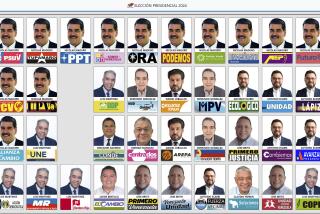Closing a Gap in the Philippines
- Share via
At the 11th hour the Philippines’ divided political opposition has found a way to suppress its differences and unite on a single ticket to face President Ferdinand E. Marcos in the election that he has called for Feb. 7. While this confronts him with the kind of challenge he comfortably believed he could avoid, he remains supremely and ominously confident. So he might. With the great powers that Marcos commands, he plainly does not intend to let his 20 years of rule be ended by anything so prosaic as an expression of democratic will.
This is not to diminish the importance of what Corazon Aquino, who will run for president against Marcos, and Salvador Laurel, who will run for vice president, have achieved. By lifting the threat of a split in the anti-Marcos vote they have made possible a truer test of popular sentiment. By combining under the label of the major opposition group, Laurel’s United Nationalist Democratic Organization, they have helped assure that poll watchers from that party will be on hand to monitor the honesty of the voting procedure. At a minimum, this should lessen the chances for the Marcos forces to commit larceny at the polls.
There is more than one way, though, to steal an election. The Supreme Court, a nest of Marcos loyalists, has stalled a decision on petitions challenging the constitutionality of the February snap election. If Marcos seems to be running poorly, the court can at any time act to cancel the voting. Or it can withhold a ruling until after the election, and then nullify the results if Marcos loses.
By combining their forces, the opposition groups have at least made it more likely that Marcos will have to resort to fraud or legal manipulation to stay in office. There is one virtue in this bleak possibility: A theft of power would deny Marcos the claim to political and moral authority that would be his if he won relatively cleanly against a fragmented opposition. A small consolation, maybe, but for the future of the Philippines not necessarily an insignificant one.
More to Read
Sign up for Essential California
The most important California stories and recommendations in your inbox every morning.
You may occasionally receive promotional content from the Los Angeles Times.













